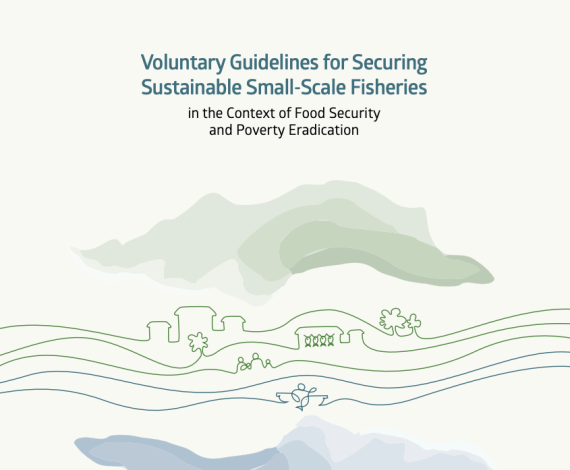
SSF Guidelines
The SSF Hub was created to support small-scale fishers, fish workers, their communities, and their allies, implement the Voluntary Guidelines for Securing Sustainable Small-Scale Fisheries in the Context of Food Security and Poverty Eradication (SSF Guidelines). Read more below to learn about this important international instrument.
The Voluntary Guidelines for Securing Sustainable Small-Scale Fisheries in the Context of Food Security and Poverty Eradication (SSF Guidelines) are the first international instrument dedicated to small-scale fisheries – an important milestone because decision makers from around the world recognized that SSF merited recognition and attention. They were developed by small-scale fishers and fish workers and many other contributors, from government and civil society, giving a strong voice to fishers and fish workers in a manner that was long overdue. And they were adopted unanimously by the UN FAO’s Committee on Fisheries in 2014, ushering in a new phase in recognizing and taking action to protect fishing communities.
The Guidelines give all of us a fundamental roadmap to follow in securing sustainable small-scale fishing, encompassing all activities along the value chain, and fishing communities, to help us eradicate hunger and poverty with sustainable fishing. Read more.
Click here to watch a short video introduction to the SSF Guidelines. Click here to download the SSF Guidelines in English and here to access the Guidelines in other languages.
The SSF Guidelines speak to governments, civil society and fishing communities, businesses and all other stakeholders, spelling out what each should do to support the lives and livelihoods of small-scale fishers and fish workers, men and women both. They take a human rights-based approach, meaning that they put people, rather than fish, in the center. Read more.
The Guidelines lay out principles and recommend policies, strategies and actions to promote fishers, fish workers, the fish they rely on for food and income, and their livelihoods and communities. They are global in scope, apply to the whole value chain In both marine and inland waters, and they call for actions at national, regional and international levels. They are voluntary, which means that all parties are called upon to take actions, but the Guidelines alone do not create legal obligations or rights.
The SSF Guidelines cover a number of key areas that are important for protecting fishers, fish workers, their communities, and fishing resources:
- Ensuring that fishers and fish workers have secure tenure rights (the rights to fish, shellfish, marine plants, etc.), and the rights to land for landing sites, processing facilities, housing, etc equitably and given recognized legal protections. Read more.
- Managing fish resources responsibly and sustainably. Read more.
- Supporting social development and decent work for fishers, fish workers, and their communities. Read more.
- Considering the needs of fishers, fish workers, and their communities all along the value chain from catching through processing to trading fish. Read more.
- Promoting and protecting gender equality in all aspects of the value chain and community life. Read more.
- Preparing to protect against risks from shocks such as climate change, natural disasters and other unexpected crises (such as global pandemics). Read more.
The UN FAO has also created a number of guides to help people implement the SSF Guidelines. Here are a few that may be of particular interest:
- Legislating for small scale fisheries (to help governments and other parties write laws that work for managing fishing, protecting small-scale fishers’ and fish workers access rights, integrating social development with fishing, and other legal arrangements).
- Tenure rights and fishing rights (explaining the importance of tenure rights to fish and adjacent landing areas for small-scale fishers and fish workers, and offering examples of how governments and civil society can work with fishers, fish workers, and their communities to protect those rights).
- Towards gender-equitable small-scale fisheries (a handbook to help all parties understand the role of women in small scale fisheries, and how to support equity for women in fishing, processing, trading and managing fisheries).
This 2018 study has a handy list and pie-chart that summarize in different forms the key issues covered by the Guidelines (and it gives decision makers a roadmap for measuring their progress in achieving the goals in the Guidelines).
